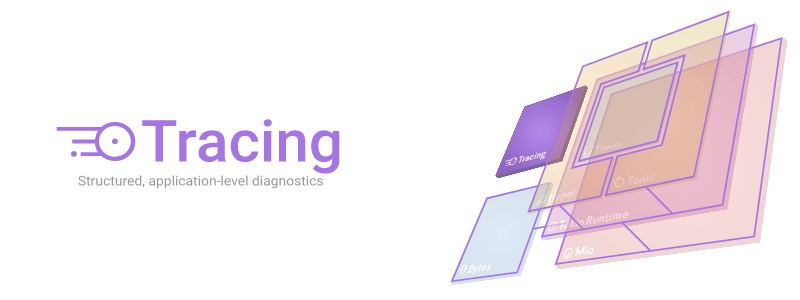6 releases
| 0.2.0 | Nov 27, 2024 |
|---|---|
| 0.1.3 | Feb 4, 2022 |
| 0.1.2 | Sep 11, 2020 |
| 0.1.1 | Feb 28, 2020 |
| 0.0.0 | Jun 27, 2019 |
#643 in Debugging
8,525,806 downloads per month
Used in 1,407 crates
(21 directly)
190KB
3K
SLoC
tracing-serde
An adapter for serializing tracing types using serde.
Overview
tracing is a framework for instrumenting Rust programs to collect
scoped, structured, and async-aware diagnostics.tracing-serde enables
serializing tracing types using serde.
Traditional logging is based on human-readable text messages.
tracing gives us machine-readable structured diagnostic
information. This lets us interact with diagnostic data
programmatically. With tracing-serde, you can implement a
Subscriber to serialize your tracing types and make use of the
existing ecosystem of serde serializers to talk with distributed
tracing systems.
Serializing diagnostic information allows us to do more with our logged values. For instance, when working with logging data in JSON gives us pretty-print when we're debugging in development and you can emit JSON and tracing data to monitor your services in production.
The tracing crate provides the APIs necessary for instrumenting
libraries and applications to emit trace data.
Compiler support: requires rustc 1.63+
Usage
First, add this to your Cargo.toml:
[dependencies]
tracing = "0.1"
tracing-serde = "0.2"
Next, add this to your crate:
use tracing_serde::AsSerde;
Please read the tracing documentation
for more information on how to create trace data.
This crate provides the as_serde function, via the AsSerde trait,
which enables serializing the Attributes, Event, Id, Metadata,
and Record tracing values.
For the full example, please see the examples folder.
Implement a Subscriber to format the serialization of tracing
types how you'd like.
pub struct JsonSubscriber {
next_id: AtomicUsize, // you need to assign span IDs, so you need a counter
}
impl Subscriber for JsonSubscriber {
fn new_span(&self, attrs: &Attributes) -> Id {
let id = self.next_id.fetch_add(1, Ordering::Relaxed);
let id = Id::from_u64(id as u64);
let json = json!({
"new_span": {
"attributes": attrs.as_serde(),
"id": id.as_serde(),
}});
println!("{}", json);
id
}
// ...
}
After you implement your Subscriber, you can use your tracing
subscriber (JsonSubscriber in the above example) to record serialized
trace data.
Supported Rust Versions
Tracing is built against the latest stable release. The minimum supported version is 1.63. The current Tracing version is not guaranteed to build on Rust versions earlier than the minimum supported version.
Tracing follows the same compiler support policies as the rest of the Tokio project. The current stable Rust compiler and the three most recent minor versions before it will always be supported. For example, if the current stable compiler version is 1.69, the minimum supported version will not be increased past 1.66, three minor versions prior. Increasing the minimum supported compiler version is not considered a semver breaking change as long as doing so complies with this policy.
License
This project is licensed under the MIT license.
Contribution
Unless you explicitly state otherwise, any contribution intentionally submitted for inclusion in Tokio by you, shall be licensed as MIT, without any additional terms or conditions.
Dependencies
~97–355KB
